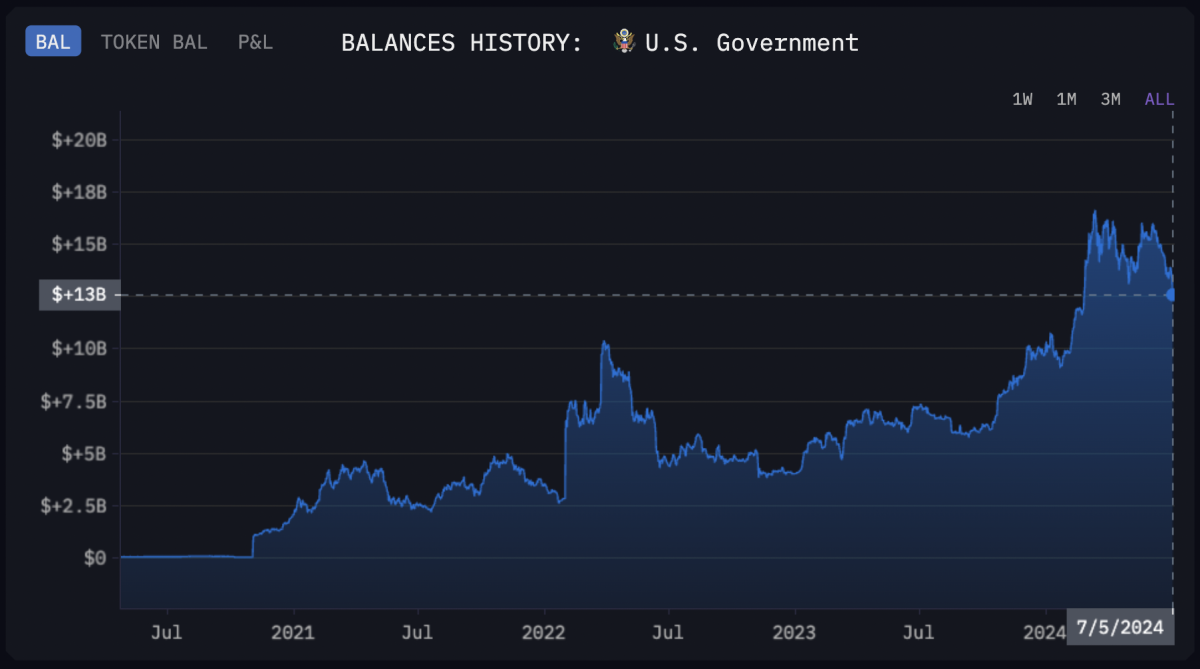In a surprising twist of fate, some of the world’s largest Bitcoin holders are not crypto whales or institutional investors, but governments themselves. Recent data from crypto analytics firm Arkham has revealed that several nations, including the United States, United Kingdom, and Germany, are sitting on a combined $17.8 billion worth of Bitcoin. As these countries contemplate how to handle their massive crypto reserves, the potential market impact of government sell-offs has become a hot topic in the crypto community.
The United States leads the pack with an estimated $12 billion in Bitcoin, mostly seized from high-profile criminal cases like the Silk Road bust. Germany follows with $2.2 billion, while the UK holds approximately $3.3 billion. These substantial holdings have raised questions about how government liquidation strategies might affect Bitcoin’s price and overall market stability.

Crypto analyst Ki Young Ju of CryptoQuant offers a reassuring perspective, stating that government Bitcoin selling is “overestimated” compared to overall market inflows. According to Ki, the $9 billion in government-seized Bitcoin represents only 4% of the total $224 billion that has flowed into the market since 2023.
Govt #Bitcoin selling is overestimated.
$224B has flowed into this market since 2023. Government-seized BTC contributes about $9B to the realized cap.
It's only 4% of the total cumulative realized value since 2023. Don't let govt selling FUD ruin your trades. pic.twitter.com/12fy2sKsXH
— Ki Young Ju (@ki_young_ju) July 5, 2024
However, the timing and execution of these sales could still have significant short-term effects. Germany’s recent announcement to sell around €1 billion worth of seized cryptocurrency through over-the-counter (OTC) trades has already caused ripples in the market.
JUST IN: On-chain data confirms this is the second-largest liquidation event in #Bitcoin's entire history, right after the #FTX collapse in November 2022.
This comes amidst news that Germany is selling $3.5B worth of seized $BTC, and Mt. Gox begins paying back $8.5B to… pic.twitter.com/Cf1GJgU1ga
— WhaleWire (@WhaleWire) July 5, 2024
The U.S. government’s track record in Bitcoin sales adds another layer of intrigue. Data compiled by researcher Jameson Lopp suggests that previous U.S. liquidations may have cost the government billions in potential gains. In one notable instance, 50,000 BTC sold for $19 million in 2014 would be worth over $3.1 billion at current prices.
This historical context raises questions about whether governments might adopt more strategic approaches to their Bitcoin holdings in the future. Some politicians have argued for holding onto seized crypto assets to benefit from potential appreciation, while others push for immediate liquidation.
As the crypto market continues to mature, the role of government-held Bitcoin in shaping market dynamics cannot be ignored. Whether these massive holdings will act as a stabilizing force or a source of volatility remains to be seen.
Statt #Bitcoin als strategische Reservewährung zu halten, wie es in den USA bereits debattiert wird, verkauft unsere Regierung im großen Stil. Ich habe @MPKretschmer, @c_lindner & @Bundeskanzler @OlafScholz darüber informiert, warum dies nicht nur nicht sinnvoll, sondern… pic.twitter.com/v9FpzmfLbp
— Joana Cotar (@JoanaCotar) July 4, 2024
For now, crypto enthusiasts and investors alike are keeping a close eye on government wallets, knowing that the next big move could come not from a shadowy whale, but from the very institutions Bitcoin was designed to circumvent.




